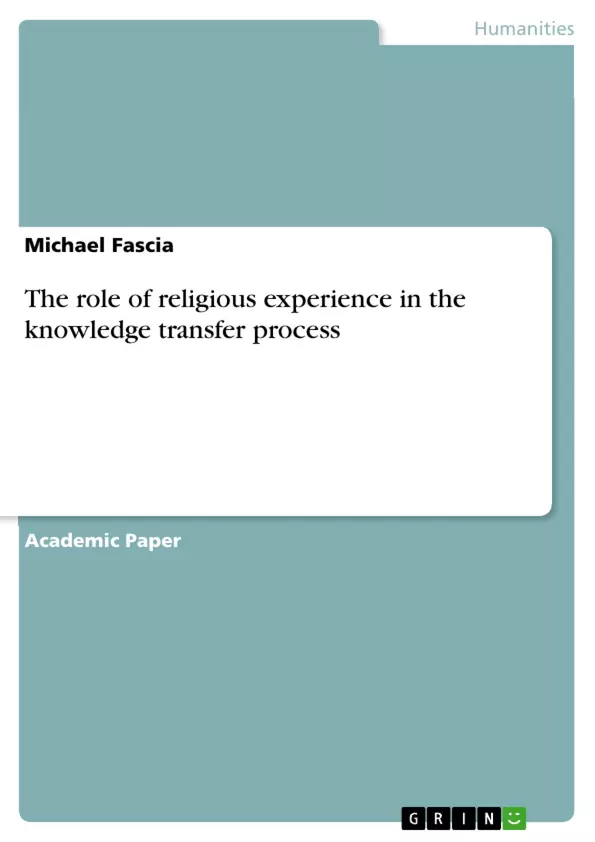The importance given to knowledge in relation to business success has never been so great as it is today and there is a substantive amount of important and informed studies reflecting this. Nonetheless, informed approaches by prominent authors generally focus on knowledge transfer mechanisms and the efficiency of these mechanisms to support and deliver competitive advantage. An overarching objective of understanding efficient knowledge transfer is therefore a central caveat for businesses wishing to achieve success and maintain competitive advantage since it is clear that any significant degradation of efficiency will directly affect this objective. Many studies do recognise the creation of knowledge as a significant factor in determining how effectively a business develops, and knowledge creation is used as a baseline for numerous historic and current studies.
To date, however, there have been few studies which denote the affect of socio-cultural or religious phenomena within a transfer scenario as significant, and how this interaction may affect the outcome of the knowledge shared or exchanged in a business context. This paper therefore examines how, in a business context, knowledge transfer is influenced by perspectives given to the knowledge. This rational is deliberate since the transfer of knowledge is rarely a simple unproblematic event. In this regard, we look at a significant amount of literature and research which has been constructed in a bid to understand both the problematic nature surrounding the mechanics of the transfer sequence and definition of the term ‘knowledge’ to support the establishment of meaningful baselines. The paper then summarises these theoretical baselines into segmented contexts with deliberate intention.
Inhaltsverzeichnis (Table of Contents)
- Introduction
- Philosophy: Knowledge of Knowledge
- Organisational: Relative Perspective
Zielsetzung und Themenschwerpunkte (Objectives and Key Themes)
This paper examines the influence of perspectives given to knowledge on knowledge transfer within a business context. The author argues that the transfer of knowledge is a complex process influenced by various factors, including the social and cultural contexts of the sender and receiver.
- The role of religious experience in knowledge transfer
- The importance of understanding the sender and receiver's belief systems
- The impact of tacit and explicit knowledge on transfer mechanisms
- The difficulties associated with transferring knowledge in organisational settings
- The limitations of traditional knowledge transfer theories in explaining the role of socio-cultural and religious experiences.
Zusammenfassung der Kapitel (Chapter Summaries)
- Introduction: This chapter introduces the significance of knowledge transfer in achieving business success and highlights the gap in current research concerning the influence of socio-cultural and religious factors on knowledge transfer.
- Philosophy: Knowledge of Knowledge: This section delves into philosophical theories of knowledge, exploring the concepts of phenomena and noumena and their implications for understanding knowledge transfer. It examines the work of Kant, Hegel, and von-Mises and highlights the challenges of understanding knowledge from different cultural perspectives.
- Organisational: Relative Perspective: This chapter explores different perspectives on knowledge management and transfer, examining the distinctions between tacit and explicit knowledge and discussing the role of social aspects in knowledge exchange. It critiques existing literature for neglecting the importance of religious experience in understanding knowledge transfer.
Schlüsselwörter (Keywords)
The main keywords and focus topics of the text are knowledge, knowledge transfer, success, competitive advantage, religious experience, socio-cultural context, tacit knowledge, explicit knowledge, organisational context, and philosophical perspectives.
- Quote paper
- Michael Fascia (Author), 2005, The role of religious experience in the knowledge transfer process, Munich, GRIN Verlag, https://www.hausarbeiten.de/document/418323


